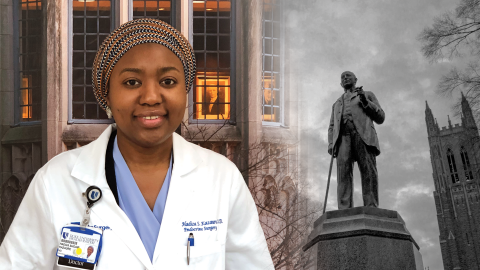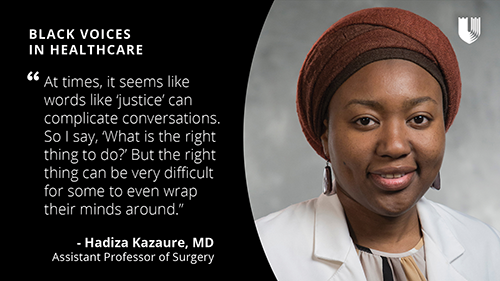
This piece is part of a series featuring Black voices from the surgical and emergency medicine communities at Duke.
About Dr. Hadiza Kazaure
Dr. Kazaure was born in Nigeria and moved to the United States to attend college. She received a bachelor of science at Temple University, followed by medical school training at Yale University School of Medicine. After her general surgery residency at Stanford, she completed an Endocrine Surgery fellowship at Duke. She became an Assistant Professor of Surgery in the Division of Surgical Oncology at Duke in 2020.
Q: Could you describe the path that led you to a career in medicine? Did your own race affect that journey?
I should start by saying that I was born in Nigeria. But I've lived in the United States for the past 18 years or so. I went to college in Philadelphia. Temple University has a very diverse student population. I lived in a poverty stricken part of the city. I was without family. The experience was an eye-opener for me. It was in Philly that I truly began to appreciate what it means to be different and to be a minority. I even took courses to understand the history.
I wouldn’t say that race was a decisive factor in my desire to pursue a career in medicine. But in medical school, I gained deeper appreciation of the impact of skin color on one’s life. When you are a medical student, you spend a lot of time with patients. And you’d keep seeing a familiar issue play out in real life: that race often determines one’s health status, quality of life, and even lifespan. You’d meet patients who are trying to do everything right, but are deterred by many obstacles. You’d feel powerless.
The San Francisco Bay Area is a different world. It is a rather affluent part of the country. There are fewer Black people there, and so when you walk into a room, you may not be the person patients were expecting. Some might mistake you for a nurse.

Q: You mentioned witnessing racial disparities in health care. Do you have any suggestions or solutions to this systemic problem?
Duke has the advantage of having very strong ties to the community. That’s a major plus. The connection is already there. That said, the importance of having a diverse workforce cannot be overstated. I can't tell you how many times I walk into a room, and there is just this palpable sense of relief. "Oh my gosh, you’re my surgeon? I can’t believe it—you’re like me!" When you have a diverse workforce, you broaden your horizons and your talent pool. You are better able to understand the challenges patients face, how to connect better with patients, and how to enhance community engagement. You can inspire others too.
I recently took a racial disparities course. I learned a ton about the science and art of addressing disparities. In studying the health outcomes of African American patients or Hispanic patients, a comparison to non-Blacks or non-Hispanics is just step one. We then need to conduct focused research on the vulnerable population itself. For me, one subtle takeaway from the course is that a diverse workforce can boost our ability to enroll specific patient populations in research that could lead to targeted interventions that minimize disparities in the local community and improve outcomes.
Q: This year has been a difficult one, first with COVID-19 and then with the pandemic of racism in our country. How has it affected you personally and professionally?
The heightened sensitivity to racial issues is a re-awakening. I think that the nation cares. Most people care. The pandemic is real. That said, how do we get people to approach the problem with sensitivity? How do we come up with solutions that will endure? How do we even normalize the conversation? At times, it seems like words like “justice” can complicate conversations. So I say, “what is the right thing to do?” I think that most people care and want to do the right thing. But the right thing can be very difficult for some to even wrap their minds around. One hopes that things change, and one hopes that the nation as a whole takes a great step forward. Personally, I don’t think I will ever be able to watch the entire George Floyd video. I can’t. Along the lines of that famous Ralph Emerson quote, my hope is that someone out there breathes easier simply because I have lived.
Give to Duke Surgery
A gift to the Department of Surgery is a gift of knowledge, discovery, and life.